There were four powerful and emotional moments when I was brought to tears while attending the 2016 National Ligonier Conference. Overall, the entire conference was just a brain-jamming of theological information. Lectures started in the morning around 8:00 or 9:00 depending on which day, and didn’t end until 9:00 p.m. It felt a lot like jamming half a semester of college classes into two-and-a-half days.
And yet, it was more than academic. It was also very spiritually and emotionally fulfilling.
This was our first year ever attending the conference. We escaped the brisk February weather of Baltimore and made our way to Orlando. I was excited at the prospect of listening to R.C. Sproul lecturing live, along with discovering theologians, pastors and thinkers I hadn’t been exposed to, yet.
When we arrived, the parking lot was packed, and we found a spot on the grass among RVs and even tents pitched outside. Thousands of people had registered. We were two excited, geeky Christians, so giddy to go in.
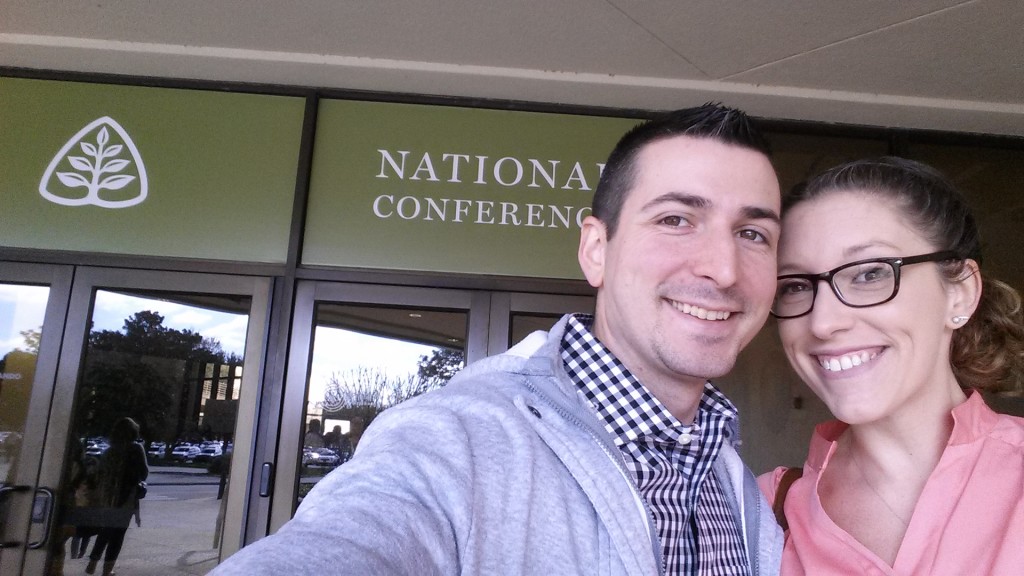
So, of course we took a selfie before even stepping foot inside.
We arrived a bit late. Albert Mohler had already started a presentation on the Gospel as Historical Fact. But right away, I knew we were in for a great intellectual ride. Christians, from a secular perspective, often get accused of allowing their thinking being riddled by senseless emotionalism, blind faith and little intellect. Here, all those stereotypes were shattered. These presenters were thinkers. Deep thinkers. They could go toe-to-toe with any secular intellect. They were critical. Prepared. Intimidating, almost. I was so impressive by their ability to memorize not only long passages of scripture but also poetry and a variety of quotes. They were intimately familiar with Church history and our contemporary culture. These were theologians in touch with society. In touch with our hurt, fears and need of the Gospel. As R.C. Sproul likes to put it, they are not “Ivory tower theologians,” but they witnessed down in the trenches of our shared human experience.
I loved that. I loved their very presence. Tall, bold, well dressed. They were fiery, compassionate and decisive in every point they made.
That’s why I was so unprepared when R.C. Sproul entered the stage …
First tears: Seeing R.C. Sproul for the first time
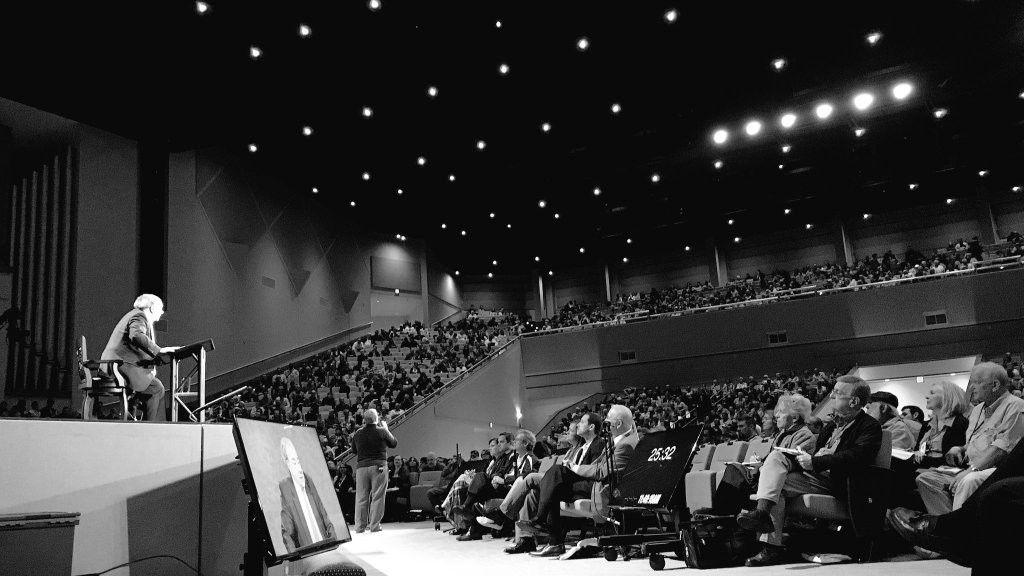
R.C. entered the stage on a scooter breathing in from the tubes of an oxygen tank. I was shocked. And tears came to my eyes. It was like seeing a grandfather for the first time after so many years and being unprepared by how much he had aged since the last time you’d seen him.
The very thought that came to my mind was awful (and I hope untrue): “This might be his last national conference.”
Now, to be honest, this was the first and only time I’ve ever seen R.C. Sproul in person, but if you’ve watched any of his video lectures, listened to him on the radio, or seen those iconic photos of him teaching, with his hands in the air, posture about to pounce off his podium … you almost get a sense of knowing the man. I promise this is not an exaggerated sentiment. I don’t get sentimental or giddy over “celebrities.” But in a way, I felt like I “knew” this man. Like he had been to my living room time and time again (which he had, only through a television screen). Plus, we both have a great love for Pittsburgh. A city that feels more like a town, and where you can forgive anyone who cuts you off in traffic so long as they have a Steelers bumper sticker on the back.
I had envisioned R.C. Sproul coming on stage bouncing around the way he does during lectures. Buttoning and unbuttoning his jacket repeatedly. Writing on his chalkboard. Flailing his hands around for emphasis. Speaking gently, carefully and yet so joyfully and vibrantly.
This is one of the greatest theological minds and teachers of our generation, truly respected by his peers and fellow theologians. And I saw him on that stage, so frail. I couldn’t help but cry.
Second Tears: The beauty of adoption
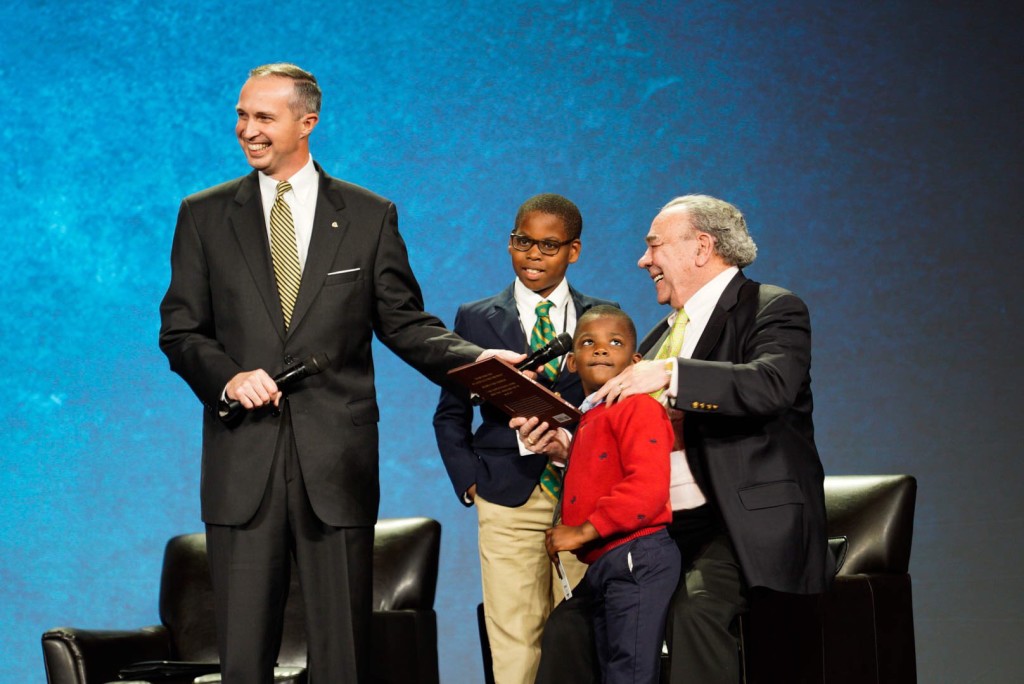
The second instance of tears also had to do with R.C. Sproul, but I promise I won’t keep going on my sappy love for this man after this one.
At one point in the conference, Chris Larson, CEO of Ligonier Ministries, announced R.C. Sproul’s publication of his 100th book: “The Knight’s Map,” a children’s book about a knight who receives a map by a mysterious king to come find his kingdom. During the book’s announcement on stage, R.C. Sproul read the dedication: “To Donovan, Reilly, and Campbell, grandsons whom I trust will follow the map given to the knight by the king.”
He then joked — in a way only a charming grampa could — that the book was dedicated not to just any grandsons but his favorite grandsons. Only two of the boys were in the crowd, and Chris called them to come up on stage. I don’t remember which two of the three named boys these were, but immediately I recognized why these were his “favorite.” They were adopted, and from a Christian worldview, I believe adoption is one of the most beautiful and tangible presentation of God’s grace, as we are his own adopted children in Christ.
The boys went right up to their grandpa and hugged him, and that love expressed between R.C. Sproul and his boys was so affectionate and authentic, that it reminded me of God’s love for me. I’ve been adopted by God, even though I look nothing (physically or spiritually) like his own son, Christ.
Third Tears: Hurting Jesus
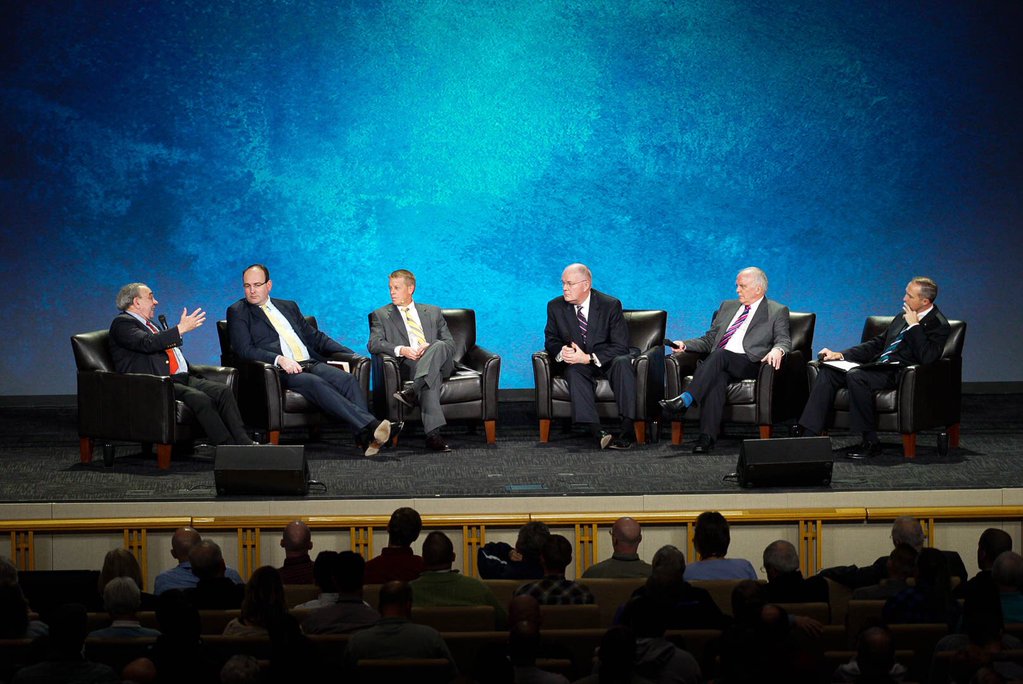
One of the great experiences of the Ligonier Conference is when a group of lecturers sit in a horseshoe on stage and answer some of the audience’s questions. Audience members write their questions on a notecard ahead of time, and a moderator decides which questions to pose to the group.
As these men talk and discuss, it really does feel like sitting in the living room with them. They let their academic hair down without abandoning their academic minds. They’re genuine, sincere and even downright goofy at times, cracking jokes with each other in a way that makes you feel part of their tribe.
There’s very little debate here. These teachers think alike on most of the fundamental Christian subjects, but it’s wonderful to watch and listen to them serenade a question with their own heartfelt (and mind-felt) answers.
One of the questions asked dealt with whether or not our sins hurt God.
In the silence that follows each question (sometimes brief, other times a bit more lingering), the audience has the opportunity to reflect and answer on their own quietly before the “masters” get a crack at it. I can’t remember how long this pondering silence lasted, but it was long enough for me to formulate my own knee-jerk response:
“Of course not!” I was convinced. “Nothing can hurt God. He’s invincible.”
Though, when the panelists answered, I was both surprised and humbled. I can’t remember exactly how the answer unfolded, and I wish I had written it down, but in the aftermath of the answer, I was so stunned by the response that I felt the auditorium go black as I pondered and mourned.
Essentially the answer was this: Though our actions cannot “hurt” or “injure” God in an “attacking” sense, our sins do cause God to mourn, and therefore, they cause Jesus pain as well.
This was a deeply critical moment of concern for me. It forced me to reflect on my sins with great pause. Yes, I knew Jesus had suffered on the cross and, therefore, had paid for my sins, and yes (as a good Calvinist) I understood that my belligerent acts of sin (though grave) could not cause me to lose salvation. However, there was a twist in this arrangement I had not considered.
Jesus had suffered the most humiliating death of all. He had suffered tremendous pain. He had suffered unjustly. And to think that in my regenerated, saved state, I was guilty of causing any “additional” suffering — to cause him to mourn my actions — through my continual acts of sin was painful to consider. Hadn’t Jesus suffered enough? Yet, no, Jesus, take on some more pain as I ignore your father’s commands and decide to obey my flesh instead! You can handle more pain, can’t you? You’ve paid it all on the cross, so what’s another sin here or there going to do to you?
In my active sins, I was abusing one of the greatest friendships I ever had.
Think of that. Think of causing additional pain to a friend who has done so much for you, at great personal cost to him, and yet piling it some more, day after day.
If you’re a Christian, I hope you find that concept deeply painful, as I personally do.
Fourth Tears: Together with Christ
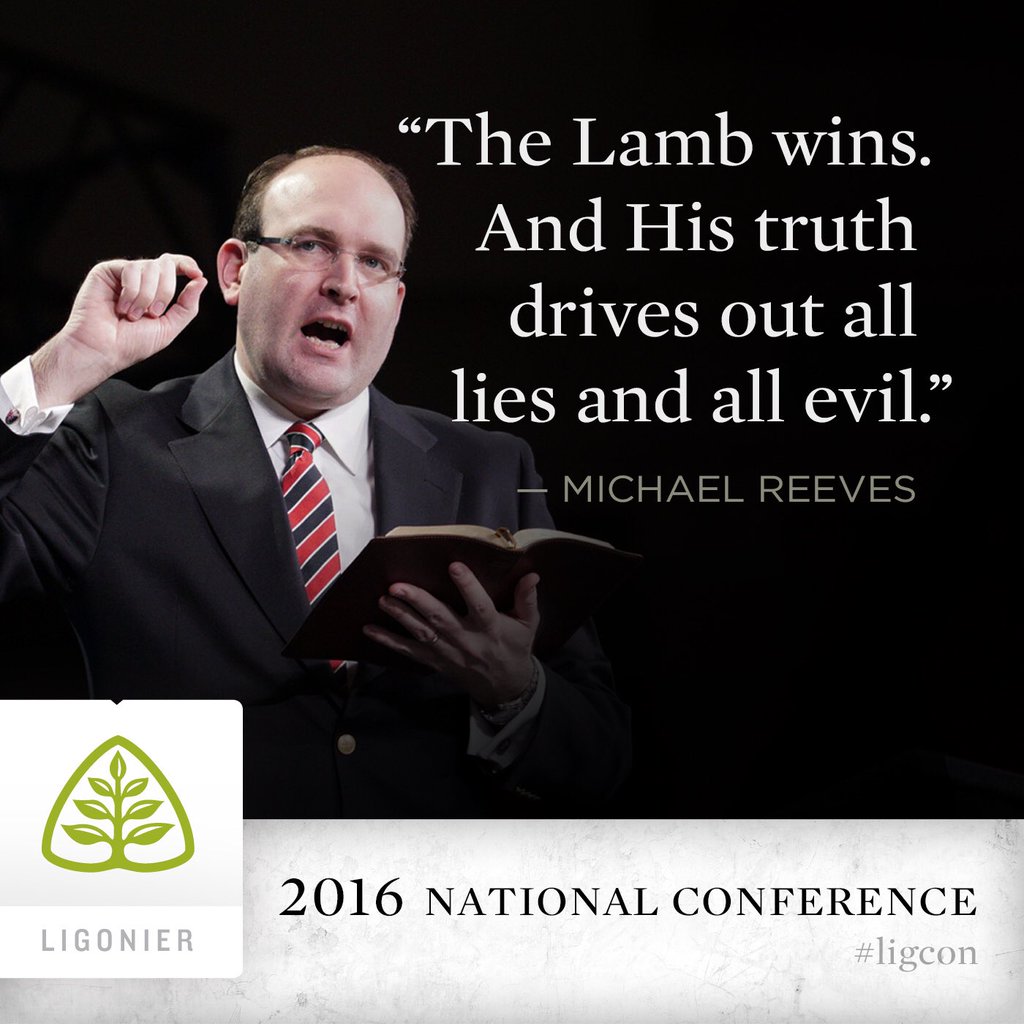
One of the great joys of attending this conference was listening to teachers with wonderful British and Scottish accents. Now, I will admit, when Heather and I watch British shows on Netflix, I have to turn on the subtitles. I just can’t follow the dialogue that well! But fortunately I wasn’t as lost without subtitles here.
One great Brit was Michael Reeves, who presented several times. His most powerful message was titled, “All Things New: The Return of Christ.” He used Leviticus 25:9-12 as a springboard for his message.
This Old Testament passage anticipates another trumpet sound that is to come, announcing Christ’s final return.
This, Michael Reeves called, “a foretaste of the Bible’s cosmic hope … The awaited high priest returns and the trumpet sound announces a time of rest.”
He went on to Psalm 98, a reminder to make a “joyful noise to the LORD” who will return as Judge. Why would such a terrifying idea bring us joy? How could we cheer at this?
Reeves said, “Jesus is our Joshua who comes to cleanse the Earth for his people. The destruction of sin is to reclaim justice. This is terrifying for those who cling to evil, but a great joy for those who cling to Christ.”
We will cling to Christ. We will be united with him. Undivided. The purity of his desires will become all we know.
“He will finally and completely undo the fall,” said Reeves. “Sin brought all the thorns and thistles of this world. His return will undo all that.”
It will undo death, pain, marital struggles. He will undo all chaos.
“He will not merely restore Eden. It will be better than Eden for Jesus is far better than Adam,” he said.
And that idea of unity, of being completely glorified with Christ, was the most overwhelming and most joyful reminder of the entire conference. Likely, this was the best lecture of the entire weekend, at least in how deeply it moved me.
And I was so happy and thankful to have taken part in this conference with my wife, Heather. Our brains (and hearts) were certainly overflowing by the end of the third day, and we’ve already signed up to attend the 2017 conference.
Next year, Ligonier will celebrate not only the last 500 years of the Reformation, but also look ahead to 500 more years of hopeful reformation in our culture and church. I just hope next conference doesn’t cause 500 moments of tears. My shirt would be drenched, and I may not be able to handle that.
 Michel Sauret – Award-Winning Army Journalist | Independent Author Award-Winning Army Journalist, Independent Author
Michel Sauret – Award-Winning Army Journalist | Independent Author Award-Winning Army Journalist, Independent Author






